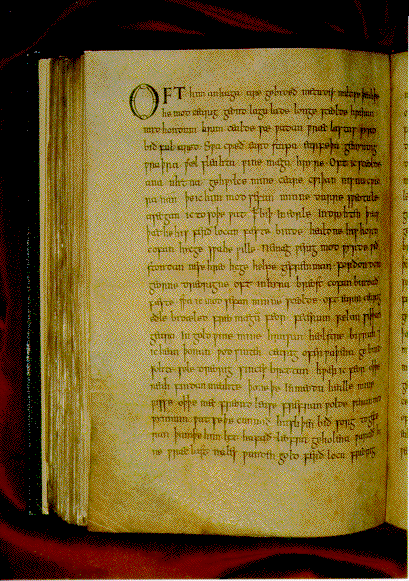
The Exeter Book, "Wanderer," and "The Wife's Lament"
When English books were rare (before Caxton began printing in English with moveable type, c. 1475), all the "literature" in a region might be contained in a sort of single-volume "library" bound together between wooden boards usually made of beech, from the German name for which we get the word "book" via Old English. The great book we know as the "Exeter Book" was given to the library of Exeter Cathedral by the first bishop of Exeter, Leofric, who died in 1072. His will describes one great "englisc boc" which scholars believe could only have been the Exeter Book because of its extraordinary size. Its parchment leaves measure about 12.5 inches by 8.6 inches, slightly larger than a standard sheet of American paper, and the book originally probably contained a total of 131 leaves. It probably was written by a single scribe. At some time after Leofric's donation, but before its first study by a Renaissance antiquary named John Joscelyn, someone bound an additional eight leaves to its front, but also, the original first eight leaves were torn out, leaving the first original text (the hymn "Christ") lacking its beginning. The Exeter Book is our only surviving source for most works it contains, the most famous of which are "The Wanderer," "The Seafarer," "Widsith," "Wulf and Eadwacer," "The Wife's Lament," and a great collection of the witty riddles at which the Old English poets excelled.
The manuscript survived because the Exeter Cathedral library resided in a building which would escape the dangers of fire and storm, civil war and two world wars. Even so, the ravages of time inflicted upon this unique text in nearly a thousand years can best be appreciated by George Phillip Krapp and Elliott Van Kirk Dobbie's editorial description of the damage it sustained:
"The manuscript, though well preserved on the whole, has suffered severe damage in several places. The fact that fol. 8a, the first page preserved of the original manuscript, has been scored over with knife strokes suggests that at one time in its history the book was used as a cutting board. Near the outer margin of this folio, where two very deep strokes come together, a triangular piece has been torn out of the parchment, apparently containing the final n of eadga[n], Christ 20. A vessel containing liquid, perhaps a beer mug, has made a circular stain near the center of fol. 8a. The liquid has been spilled over a large portion of this page, and has gone through the next two folios also, causing a brown stain on these folios and making the text in some places very difficult to read. This severe damage which fol. 8a has suffered indicates that the lost folio at the beginning of the manuscript was detached from the rest of the book at a very early date, and that from that time on, the book was without a binding at least until after folios 1 to 7 were added at the beginning. [ . . . ] . . . by far the greatest damage to the manuscript has been done on the last fourteen folios, where a long diagonal burn has destroyed much of that text. "
With that in mind please view, with the respect due a venerable survivor, the following image of "The Wanderer"'s opening lines on Exeter Book fol. 76b--

In printed editions, the first full sentence of this page is represented this way:
Oft him anhaga are gebideš
metudes miltse, žeah že he modcaerig
geond lagulade longe sceode
hreran mid hondum hrimcaelde sę,
wadan wręclastas. Wyrd bięš ful aręd!
The more sharp-eyed among you will be thinking, "Aha! There aren't any casurae (half-line divisions) in the original manuscript, and the lines are set out like prose, not broken like poetry!" But look more closely and you'll see the scribe has left slightly larger spaces at some of the casurae, and in others (according to George Philip Krapp and Elliot Van Kirk Dobbie, editors of the Anglo-Saxon Poetic Records edition) the scribe uses his only punctuation mark, the point or period, to indicate those half-line breaks. Nonetheless, doesn't this challenge, somewhat, our sense of the essential difference between poetry and prose?
The poetry in the Exeter Book's 131 surviving parchment leaves is the largest collection of Old English literature we have, in addition to the Junius MS, the Verecelli Book, MS Cotton Vitellius A.xv ("Beowulf" and "Judith"), and the Paris Psalter. It appears to have been copied by a single scribe, probably in the late 10th century, though "The Wanderer" doubtless is much older, perhaps dating to the conversion of the Anglo-Saxon tribes to Christianity, which began with St. Augstine's mission to the southerners in 597. "The Wanderer"'s frame narrator offers clearly Christian advice in response to the Wanderer's lament for lost worldly things. "The Wife's Lament," by contrast, seems to be at least somewhat older because it offers none of the typical Christian consolations for her despair and appears to reflect a pre-conversion, pagan attitude toward one's fate. The book contains 31 major poems, as well as 96 riddles. Of course, reading any heavily subordinated Old English poetic sentence, with its many kennings (metaphoric phrases), strangely resembles solving a riddle.